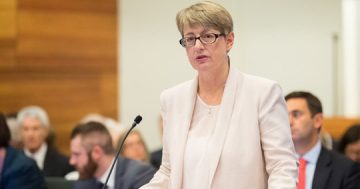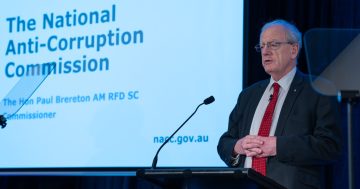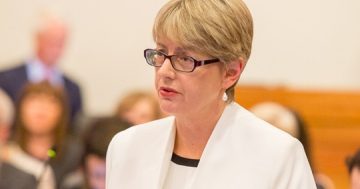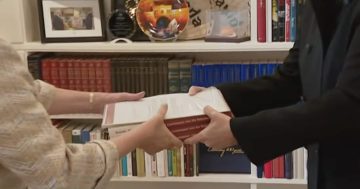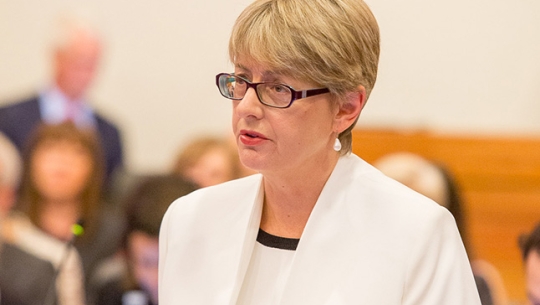
Gail Furness SC, the Inspector of the National Anti-Corruption Commission, is well into her inquiry into why the NACC wouldn’t investigate over Robodebt. Photo: File.
Nervous nellies at the National Anti-Corruption Commission now have more cause for concern over their decision not to investigate anyone over the illegal Robodebt scheme.
Gail Furness SC, the Inspector of the NAAC, has issued a statement to update the public about her investigation into the commission’s decision to lie down over the tragedy, confirming that her inquiry is well underway and its results will be released.
“The Inspector has received many inquiries as to the progress of her inquiry from the media and the public,” the statement from her office said on Friday (27 September).
“The Inspector is conducting an investigation under section 184(1)(e) of the National Anti-Corruption Commission Act 2022 into the decision by the National Anti-Corruption Commission not to investigate the referrals from the Robodebt Royal Commission.
“Between June and August 2024, the National Anti-Corruption Commission provided the Inspector with documents the Inspector had requested.
“On 3 September 2024, the Inspector asked the National Anti-Corruption Commission to provide submissions on a range of specified matters.
“The National Anti-Corruption Commission has advised that it anticipates that it will provide those submissions by 21 October 2024.
“When the Inspector completes her investigation she will prepare a report as provided for in Part 10, Division 4, Subdivision B of the National Anti-Corruption Commission Act 2022.”
In June, the NACC alerted the nation to its unfathomable decision not to investigate anyone who Robodebt Royal Commissioner Catherine Holmes AC SC had referred to it for potential prosecution.
“The Commission is conscious of the impact of the Robodebt Scheme on individuals and the public, the seniority of the officials involved, and the need to ensure that any corruption issue is fully investigated,” the NACC said at the time.
“However, the conduct of the six public officials in connection with the Robodebt Scheme has already been fully explored by the Robodebt Royal Commission and extensively discussed in its final report.
“After close consideration of the evidence that was available to the Royal Commission, the Commission has concluded that it is unlikely it would obtain significant new evidence.”
The immediate public outcry caused the commission’s own independent inspector to step up and call for a “please explain”.
The inspector, Ms Furness, is not subject to anyone’s direction in performing her functions and exercising her powers, but must prepare an annual report to be tabled in Federal Parliament.
The Inspector of the National Anti-Corruption Commission is an independent officer of the Federal Parliament, established under the act.
According to its own official website, the inspector:
- Investigates National Anti-Corruption Commission (NACC) corruption issues that could involve corrupt conduct that is serious or systemic;
- Investigates complaints of maladministration or officer misconduct relating to the NACC;
- Audits the NACC’s operations for compliance with Commonwealth laws.
The Parliamentary Joint Committee on the NACC monitors the inspector’s performance and reports on such to the parliament.
In the few days following the NACC’s announcement that it didn’t think the illegal activities of public officials involved in the rollout of the Robodebt scheme warranted its scrutiny, Ms Furness received almost 900 complaints.
“Many of those complaints allege corrupt conduct or maladministration by the NACC in making that decision,” Ms Furness said in a statement on 13 June.
“I also note that there has also been much public commentary.
“Accordingly, I have decided to inquire into that decision. I anticipate that I will make my findings public in due course.”
The Australian Public Service Commission’s Robodebt inquiry recently delivered its report, finding 12 former and current public servants to have breached the APS Code of Conduct 97 times.
Two former agency heads – Kathryn Campbell and Renee Leon – were identified in the inquiry’s report, which stated they failed in their obligations 25 times during their tenures leading the Department of Human Services.
Delivering his report of the inquiry, APS Commissioner Gordon de Brouwer apologised for Robodebt, describing it as a failure of government.
The Robodebt automated debt recovery scheme was piloted in 2015 and fully rolled out between 2016 and 2019 by the Department of Human Services and its successor, Services Australia, with more than 470,000 false debts issued.
It caused extensive grief and trauma. Some recipients are reported to have taken their own lives over the debts.
Original Article published by Chris Johnson on Riotact.


